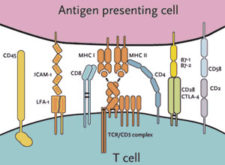I have written before about the exciting and transformative changes taking place in cancer treatment and cancer research. Cancer immunotherapy has allowed the body to gear up its war on cancer by allowing the immune system to recognize cancer cells as foreign invaders and kill them. The beauty of the specificity of this response is that normal cells are spared.
A study recently published in the journal Structure reveals how researchers are engineering immune cells to have enhanced capabilities of recognizing foreign proteins (antigens) on the surface of cancer cells.
Immunotherapy is also known as “targeted therapy” in which drugs specifically target molecules on cancer cells that are responsible for their growth and spread. They do not have the broad spectrum of action that chemotherapy does, and whereas chemotherapy kills cancer cells (in addition to normal cells) targeted therapies will block the tumor cells from proliferating.
Targeted therapies are focused on the aberration present in the cancer, whether that is abnormal proteins on the cell surface or chromosomal abnormalities within the cell nucleus. Targeted therapies can be monoclonal antibodies, which are large molecules that interact with targets outside the cell, or they can be small-molecule compounds that are capable of entering the cell.
T cells are the guardian cells of the immune system that surveille and destroy cancer cells. Receptors on T cell surfaces will recognize foreign proteins on invaders (be it on bacteria, viruses or cancer). Antigen specificity of the T cell receptor (TCR) is a hallmark of T cell immunity. Researchers at Notre Dame wanted a better understanding of the specificity of TCRs for the purposes of manipulating it. They successfully engineered a switch on the TCRs that is responsible for recognition of foreign proteins, specifically proteins on the surface of cancerous cells – which enabled a directed and “laser-like accuracy” immune response to cancer.
“Our study demonstrates new routes for custom designing functional T cell receptors with optimal antigen recognition properties. This will help open the door for customized specificity in order to optimize T cell targeting and killing,” said the head of the research team, Brian Baker, PhD, Professor and Associate Dean at the University of Notre Dame. “Immunotherapy is changing how cancer is treated.”
These advances in research are opening up the playing field for the successful treatment of cancers that were once considered death sentences.




